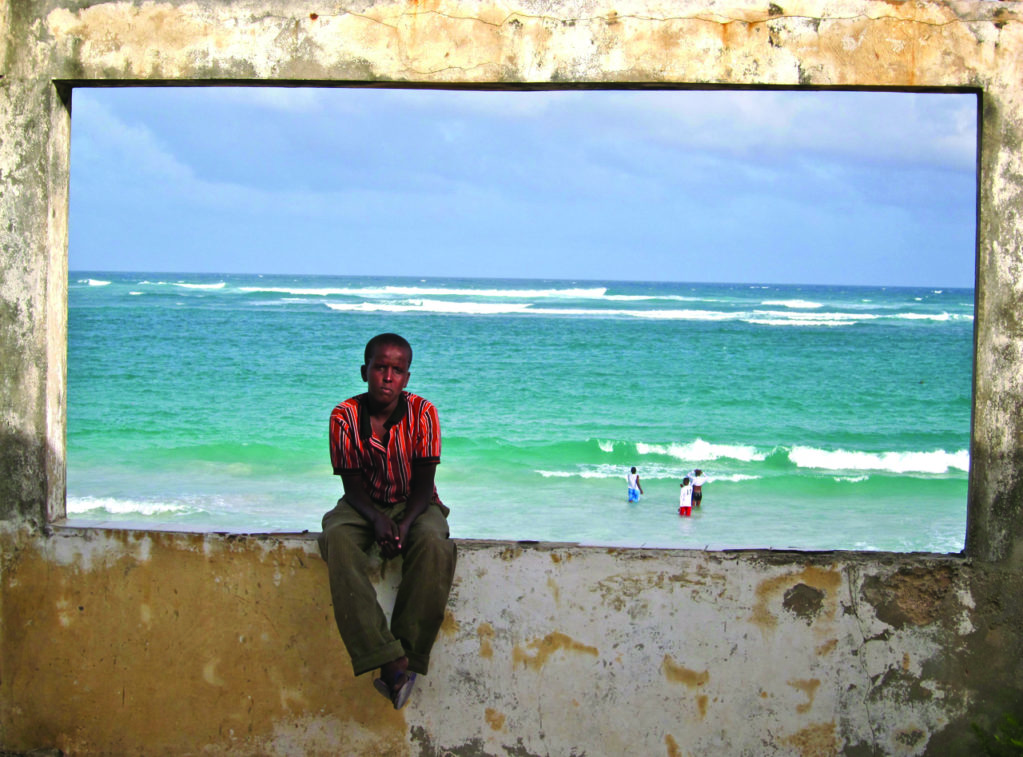Somalia’s coast, famed for piracy, is fast becoming tamed. Hundreds of miles of beaches with hardly a soul on them. No parrots, peg legs or pieces of eight. No Black Hawks down.
I flew in over a deep, deep blue ocean, flecked by white horses. A visible reef guards Mogadishu, the capital. There is the bright glare of white sand and dust everywhere, especially when you enter the Mogadishu International Airport (MIA), which is the ‘green zone’, a secure zone within which lies MIA.
Now here’s the thing, I’m writing about this country and all I’ve really seen is the MIA. But there is much to tell.
To even begin to understand what’s happening, you need a few basic acronyms. UNSOM and UNSOA, AMISOM and… oh, to hell with it.
Suffice to say, seven armies in Somalia are trying to subdue the dreaded Al-Shabaab and restore government to a country that hasn’t seen one for 22 years. In true African fashion, the politicians are still stuffing around, bickering between President and Prime Minister, fiddling while the country continues to smoulder.
Yet the fire of Al-Shabaab has been curbed from its rampant deadly destruction. There are successes for the armies of good, but the gains are fragile. Luckily the military presence is not wracked with the same kind of interminable arguing about who is in charge.
The African Union (AU) is really in charge of the military, but the AU sort of reports to the United Nations (UN), which has about 22,000 foreign troops in the country. That’s quite a lot of soldiers. Not enough, says the Force Commander, but he would, wouldn’t he. Sadly, many have been killed fighting – not for their own country but fighting for Somalia to become governable.
Vast tracts of land have been recaptured from Al-Shabaab’s influence, and in this year the soldiers are valiantly trying to keep militants away from this recaptured territory. The Force Commander says his forces now control 70% of the country.
Unfortunately Al-Shabaab does not play by the rules. It strikes with car bombs, suicide bombers, rockets, IEDs and general terror tactics. But the good guys are winning. On the ground that is, not necessarily in the political, global or African arenas.
Armies who have sent troops include Uganda, Kenya, Burundi, Sierra Leone, Ethiopia, Djibouti and Nigeria and they deserve praise for the sacrifices they have made. It is said that the UN has lost more troops here than in all their other operations combined. If true, it is a very disturbing statistic.
Things are still dangerous. On Christmas Day, the very place where I am typing this was attacked and two soldiers died. Yesterday, a car bomb exploded in Mogadishu, a literal stone’s throw away and an innocent shoe shiner died. But on the plus side, the day before, 23 Al-Shabaab people were killed by the armies in one firefight. Few people mourn the dead fanatics, and nor do I.
It is infuriating that armies are needed to restore basic human rights to people: the right to food, shelter, the right of girls to go to school, the rights of freedom to worship, freedom of speech. Al-Shabaab is wicked; it certainly does not represent Islam in the same way as the barbaric Spanish inquisitors did not represent Christianity.
The African Union Mission to Somalia (AMISOM) has brought the first fruits of peace to Somalia, and Somalis are beginning to tentatively taste the fruits. Much remains to be done, but there is already much to celebrate even if the world has not yet recognized the changes.
I spoke to some important people, the AU’s Ambassador in charge, the Force Commander, the Director of the UN contingent. All are hopeful, all cautiously optimistic.
My glimpse of the tame coast along the south central area of the country made me believe victory is possible. A very small victory, one of simply restoring government, but an important victory for Africa and especially the long-suffering Somalis.
